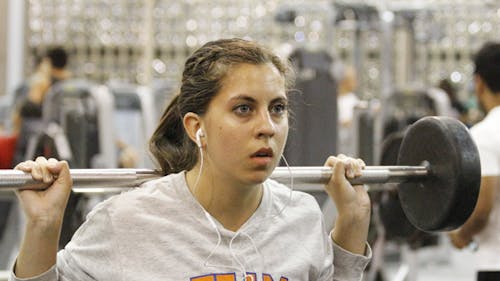Rutgers experts offer advice to first-year students on 'Freshman 15'

Since the school year has started and the doors to the dining halls have swung open, first-year students have approached the colossal cafeterias with timid excitement and curiosity.
The bountiful supplies of chocolate cakes, pizzas and chicken nuggets tantalize. Yet once waistbands start expanding ever so slightly, students eyeball the alluring candy-topped brownies with some apprehension.
The ubiquitous phrase “The Freshman 15” has upheld itself for some time as one of the most uttered pithy axioms the summer before the first year of college.
But the idea of “The Freshman 15” is nothing more than a misconception, said Peggy Policastro, the instructor and director of the Healthy Dining Team and a nutrition specialist for Rutgers University Dining Services.
The average first-year student gains seven pounds, not 15, according to a newsletter co-written by Policastro, Rutgers Dining Services and the Department of Nutritional Sciences.
The newsletter also debunks the myth that putting on seven pounds or more is the result of gorging on entire pizzas when most people are sleeping, although single-handedly eating eight slices of pizza within an hour will most certainly make its mark on the scale at some point.
Instead, Policastro said, the pounds pack on quickly when students consume only 100 extra calories per day.
Mindless munching while reading or solving problem sets for class is often the culprit of surprise weight gain, even if the munching is on healthy snacks such as carrots with hummus or fruit.
“Calories are calories,” she said.
When going to the dining hall, she urged students to diversify their plate as much as possible by selecting an appropriate amount of fruits, vegetables, whole grains and lean proteins.
But when the resolve to consistently eat healthy falters slightly, exercise should accompany it.
Physical activity does not have to mean an outfit primarily made out of spandex and a hour on the treadmill — moving can be about getting off one stop early on the bus, taking a brisk walk or run or joining a sports team.
Anne Finetto, assistant director supervisor at Rutgers Recreation, said the Rutgers University Running Team is a chance for runners to regularly run in a group on a scenic route.
Runners can also register for the annual “RU Muddy” run, “The Big Chill” and “The Color Run,” held in the fall, winter and spring, respectively.
For students that enjoy running with a twist, what is coming in October may pique their interest.
Diane Bonanno, executive director of Rutgers Recreation, said interested students can sign up for the first “Raritan River Monster,” a two-person team triathlon event. One team member bikes, the other runs and both jump in a canoe and row to the finish.
For more aquatically inclined students, Rutgers offers a non-credit scuba diving course taught by a certified scuba diving instructor at the Sonny Werblin Recreation Center on Busch campus.
The course is $200, Bonanno said, which covers the cost of the scuba diving equipment and scuba diving certification. The class is not cheap, but she pointed out that an equivalent scuba diving course outside of the University usually ranges from $400 to $500.
Given that exercise has been proven to improve energy levels and decrease stress levels, two things most college students have either too little or too much of, it’s worth slightly crunching a schedule to allow a few minutes of motion.
Regardless of whether students choose to move on land or water, in a team or on an individual level or on a casual or competitive level, Finetto said people — even the busiest of students — should try to be physically active at least four days a week for 20 to 30 minutes.
Although physical health is tremendously important, it’s also essential not to forget about mental and psychological health as well.
Feeling anxious or depressed are two common emotional issues that commonly strike students between the ages of 18 and 25, said Jill Richards, director of Counseling, Alcohol (and other Drug Assistance Program) and Psychiatric Services.
Anxiety and depression can be brought on by pressure to succeed academically, athletically or socially, or by bullying, harassment, job loss and financial troubles, among other problems. No matter the issue, Richards said CAPS is available to talk with students free of charge about their situations and lay out their options.
She offered some general tips, like focusing on the positive, keeping realistic expectations, staying organized and talking to those who care, according to an informational newsletter she authored.
Often, too many first-year students are over-stimulated in an entirely individual environment like college, according to the newsletter. Students then end up setting overly ambitious goals that they are not able to accomplish in the amount of time they planned.
Students should realize that college is supposed to be more challenging than high school and that students may need to work harder, pay more attention and seek more help than they were accustomed to, according to the newsletter.
If students are struggling with the transition process from high school to college, she said CAPS is always available, but faculty, staff and student groups are also trained to respond appropriately to personal troubles.
“The normal developmental struggle is trying to make sense of who you’ve been, who you want to be and how you’re going to carve out a niche for yourself at Rutgers,” she said.



